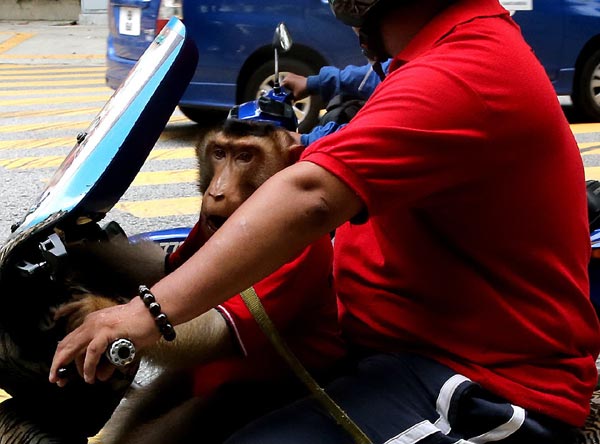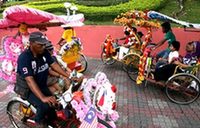Challenge of diaspora dream
 |
|
A local motorcyclist drives with his pet monkey.[Photo by Jiang Dong/China Daily] |
The ongoing "1Malaysia" program, designed by Malaysian Prime Minister Najib Tun Razak in 2010, calls for ethnic harmony, national unity and efficient governance. The government have spent more than $12 million on promoting the concept.
"In fact, the Malay people are quite friendly and easy to get along with. It is politics that tends to separate people based on ethnicity and stir tensions," says Too Hon Kwong, owner of a Chinese restaurant in Kuala Lumpur.
Too's restaurant is famous for its seafood, and has become a Chinatown favorite. It is also a popular gathering place for local Chinese. Too said he recently expanded his business to Indonesia.
The restaurant reminded me of the novel Joy Luck Club by Amy Tan, which tells the story of four mothers from four Chinese immigrant families in San Francisco forming a club to play mahjong and cook food while exchanging news.
"Your mother is in your bones," Tan wrote. Mother, in this case, also means homeland, language and culture.
Ng Tien Foo and other members of local Chinese groups are among the frequent diners. Over a pot of Pu'er tea, the old friends discuss politics, play a game of Go and share each family's joys and sorrows. And more often than not, they talk about China.
"China has made tremendous progress over the past 30 years," Ng says. "Members of our generation went to China 20 years ago to seek our roots, but now we go there mostly for business opportunities."
Ng is in his late 50s. His wife and daughter now live and work in Zhongshan, Guangdong province. As a regular visitor to China, he says he hopes the two governments can simplify visa procedures to encourage more exchanges between young people.
"Although we have been teaching our children about China and the Chinese language, it is difficult for them to foster intimacy with their ancestral land until they go and see it for themselves," Ng says.
- ‘Visit Malaysia Year 2014’ features variety of programs
- Chinese dance visits Malaysia
- Malaysia eyes attracting more foreigners for healthcare travel
- Preserving Chinese heritage in Malaysia through stela gallery
- 'Change' chosen as Chinese character of 2012 in Malaysia
- SE Asia Pu'er Tea Trade Fair kicks off in Malaysia















